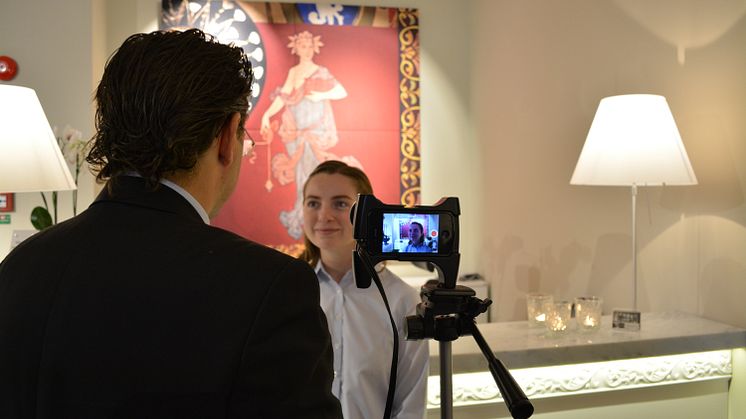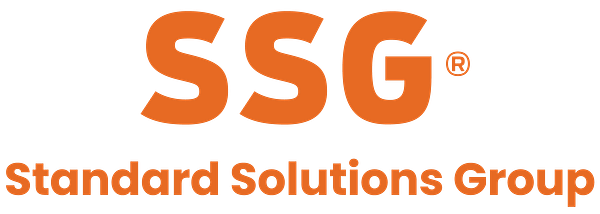
Nyhet -
"CSR is good for business!"
A three-month adventure has come to an end. 21-year-old Julie Ross left the city of Boston and came to Sundsvall in the autumn to take up a trainee position at SSG. She looked at one of SSG's services, SSG Registered Supplier, and considered whether Corporate Social Responsibility, CSR, can be extended in the workplace.
"CSR is not just a moral undertaking, it is good for business as well," says Julie Ross.
Julie Ross travelled from Boston to Sundsvall in September 2014 for a three-month adventure as a trainee at SSG. She had never been outside North America before and did not know much about Sweden. This proved not to be a problem. Joining Swedish society was no major challenge, and the rumours about reticent Swedes turned out to be exaggerated.
"Everything has gone well, and everyone has been very welcoming," says Julie Ross. "People have all taken the time to listen to me and speak English with me. The people I have been working with have been encouraging and supportive, so there have been no problems."
That said, not everything has been straightforward. The grey Swedish autumn left quite a bit to be desired.
"The weather has been a bit hard to cope with!" laughs Julie Ross. "Everything has been so dark, but Christmas and all the lights made things a lot nicer. It has been interesting to see how the Swedes cope with the darkness and make things a bit more pleasant for themselves."
Major differences in the workplace
Working in Sweden and working in the USA are very different things, and the Swedish work culture appeals to Julie. There is more equality here, she reckons, and everyone is valued equally. Swedish companies also value their staff members' time off differently and encourage mental and physical wellbeing. In the USA, people focus more on work and socialising and free time are limited. Two weeks' holiday a year and three months of maternity leave are not unusual, and the Americans could learn something from the Swedes in this regard, reckons Julie.
"In the USA, they try to squeeze as much work as possible out of each person," says Julie Ross, "and it is not uncommon for people to feel guilty when they take time off. I think the USA could learn from Sweden in this regard, people have more of a life outside work here. I think this also helps people to feel better in themselves."
What does CSR involve?
While working as a trainee at SSG, Julie has been looking at SSG Registered Supplier and how the service can be linked to CSR. Julie examined the tools used for CSR among companies and tried to find how these can be linked in with the service so as to create another dimension to SSG Registered Supplier's battery of questions. CSR is common among companies, and many people choose to include corporate responsibility when they assess suppliers.
"Companies define CSR in very different ways," says Julie Ross, "and that was what was difficult. But I had to try to form an opinion of what the most important aspects of good CSR are. Some companies say they work with CSR and maybe organise a little event on it once a year, while others do more and treat their staff differently, or secure a good supply chain and how it affects the community in general."
Julie's work has culminated in four recommendations to SSG on how it could develop its CSR work. A clearer definition of what CSR is would be necessary, and here SSG could fill a gap and create a standard for CSR, reckons Julie.
"One of my recommendations is that SSG should produce a standard for the industry, indicating what CSR is," says Julie Ross. "A committee could also be put together where companies can meet up and talk about good examples of CSR. SSG Registered Supplier is a smart tool which needs this kind of information."
Securing the supplier chain
In her work, Julie could also see that companies focusing on consumers have much more stringent demands placed on them when it comes to working with CSR. They are under greater scrutiny from the general public and the media, and consumers wield a lot of power in a competitive market. However, things are not the same for suppliers of companies, and they are not subject to the same amount of pressure.
"So how do you persuade suppliers to join in?" asks Julie Ross. "They do not feel it is as important to implement CSR work and do not apply it to the same extent.
Problems also arise when suppliers are used who in turn use subcontractors.
"So how do you gain control over the entire chain?" asks Julie Ross. "Someone engages a company which uses a subcontractor without the customer's knowledge, and they in turn use child labour. How do you stop this kind of thing happening? It is a major challenge."
In Julie's opinion, customers and suppliers meeting up and talking and attempting to understand one another's challenges and requirements would be a good start. "Companies also have to make more stringent demands of their suppliers and find out more about the products and services that they offer," she says. Pressure from customers and consumers results in the emergence of lots of good features from companies.
How much CSR work is carried out by companies varies, reckons Julie Ross. Companies often tend to prioritise the environment, while social responsibility comes second. This is maybe because the environment and sustainability are high up on the agenda at the moment, and it is also a plus if companies can show their customers that they have achieved ISO 14001 accreditation, for instance. But the overall social dimension must not be underestimated.
"CSR is not just a moral undertaking, it is good for business as well," says Julie Ross. "You will improve efficiency and results if you support people and they feel that the work they and the company do is meaningful. Investing in society and your staff will make other people willing to invest in you."
Back to school
Three months has passed quickly, and in late December Julie Ross headed back to the USA and Boston. She will be graduating in May, so her spring term will be hectic because of her adventure in Sweden. When she has finished studying, she hopes to find a job working with sustainability or CSR, subjects which fascinate her. However, her stay in Sweden is not something she will forget in a hurry.
"I have had a fantastic experience here," says Julie Ross. "I will never forget all the friendliness and helpfulness of the people here. Everyone has been kind to me, shared things with me and invited me to their homes. I really appreciate it," she concludes.

